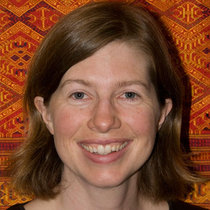Almost every day we read about floods, fires, droughts and other natural disasters occurring around the world that are the worst, or near the worst, ever recorded. We hear about ocean acidification impacting marine life, including fish and shellfish harvests. We see evidence of how the extraction and use of non-renewable energies are contributing to climate change. And we learn about the toll these events and activities are taking on human health.
Notably, the World Health Organization (WHO) held the first ever Health and Climate conference in Geneva at the end of August http://www.iisd.ca/who/hcc/. To help us make sense of what emerged from that conference and other efforts that are being undertaken to address the mounting health impacts from climate change, we invited four experts to speak to these issues from different perspectives — internationally, nationally and regionally. Dr. Andy Haines, Professor of Public Health and Primary Care at the London School of Hygiene and Tropical Medicine in London, described some of his research on the health co-benefits and economic impacts of low carbon policies in the transport, food and agriculture, and housing sectors. Dr. John Balbus, senior advisor to the Director of the National Institutes of Environmental Health Sciences (NIEHS) and NIEHS’s lead on climate change and human health in Washington, DC, highlighted the health messages included in the recent US National Climate Assessment as well as the particular vulnerability of children. Genon Jensen, Executive Director of the Health and Environment Alliance (HEAL) in Brussels, presented on initiatives among NGOs and government institutions in the European Union that bring the new health science and the voice of the health community to bear on the climate change policy. Dr. Simone Alin, Supervisory Oceanographer at the NOAA Pacific Marine Environmental Laboratory in Seattle, WA, highlighted how ocean acidification is affecting shellfish populations, specifically in Washington State, and in turn motivating stronger political action on climate change in the region.
Featured Speakers
 Dr. Andy Haines is Professor of Public Health and Primary Care with a joint appointment in the Department of Social and Environmental Health Research and in the Department of Population Health at the London School of Hygiene and Tropical Medicine. Dr. Haines was previously Director (originally Dean) of LSHTM for nearly 10 years up to October 2010, having previously been Professor of Primary Health Care at UCL between 1987-2000. He worked part-time as a general practitioner in North London for many years. His research interests are in epidemiology and health services research focussing particularly on research in primary care and the study of environmental influences on health, including the potential effects of climate change and the health co-benefits of the low carbon economy. 'He was a member of the UN Intergovernmental Panel on Climate Change for the 2nd, 3rd, and 5th assessment exercises.
Dr. Andy Haines is Professor of Public Health and Primary Care with a joint appointment in the Department of Social and Environmental Health Research and in the Department of Population Health at the London School of Hygiene and Tropical Medicine. Dr. Haines was previously Director (originally Dean) of LSHTM for nearly 10 years up to October 2010, having previously been Professor of Primary Health Care at UCL between 1987-2000. He worked part-time as a general practitioner in North London for many years. His research interests are in epidemiology and health services research focussing particularly on research in primary care and the study of environmental influences on health, including the potential effects of climate change and the health co-benefits of the low carbon economy. 'He was a member of the UN Intergovernmental Panel on Climate Change for the 2nd, 3rd, and 5th assessment exercises.
 Dr. John Balbus serves as a senior advisor to the Director on public health issues and as NIEHS liaison to its external constituencies, stakeholders, and advocacy groups. He also leads NIEHS efforts on climate change and human health. In this capacity he serves as HHS principal to the US Global Change Research Program, for which he also co-chairs the Interagency Cross-Cutting Group on Climate Change and Human Health. Dr. Balbus' background combines training and experience in clinical medicine with expertise in epidemiology, toxicology, and risk sciences. He has authored studies and lectures on global climate change and health, transportation-related air pollution, the toxic effects of chemicals, and regulatory approaches to protecting susceptible subpopulations.
Dr. John Balbus serves as a senior advisor to the Director on public health issues and as NIEHS liaison to its external constituencies, stakeholders, and advocacy groups. He also leads NIEHS efforts on climate change and human health. In this capacity he serves as HHS principal to the US Global Change Research Program, for which he also co-chairs the Interagency Cross-Cutting Group on Climate Change and Human Health. Dr. Balbus' background combines training and experience in clinical medicine with expertise in epidemiology, toxicology, and risk sciences. He has authored studies and lectures on global climate change and health, transportation-related air pollution, the toxic effects of chemicals, and regulatory approaches to protecting susceptible subpopulations.
 Genon Jensen is Execuative Director at the Health and Environment Alliance (HEAL). She has been an official member of the World Health Organization’s European Environment and Health Committee since 2000. She is also on the Steering Committee of the International POPs Elimination Network. Before setting up HEAL, she was the Director of the European Public Health Alliance. She has a degree in journalism and international politics from George Washington University in Washington, DC and an MA in European Administrative Studies from the College of Europe, Belgium. Genon frequently contributes articles on environmental health policy, including on children’s health, pesticides, mercury, and climate change, to various European and international specialist publications and newsletters. She is a co-author of several publications and reports, such as “Halting the child brain drain: why we need to tackle global mercury contamination”, “Cutting back on pesticides for healthier lives” and "Acting NOW for better health: A 30% reduction target for EU climate policy.
Genon Jensen is Execuative Director at the Health and Environment Alliance (HEAL). She has been an official member of the World Health Organization’s European Environment and Health Committee since 2000. She is also on the Steering Committee of the International POPs Elimination Network. Before setting up HEAL, she was the Director of the European Public Health Alliance. She has a degree in journalism and international politics from George Washington University in Washington, DC and an MA in European Administrative Studies from the College of Europe, Belgium. Genon frequently contributes articles on environmental health policy, including on children’s health, pesticides, mercury, and climate change, to various European and international specialist publications and newsletters. She is a co-author of several publications and reports, such as “Halting the child brain drain: why we need to tackle global mercury contamination”, “Cutting back on pesticides for healthier lives” and "Acting NOW for better health: A 30% reduction target for EU climate policy.
 Dr. Simone Alin, PhD, is the Supervisory Oceanographer at the NOAA Pacific Marine Environmental Laboratory in Seattle, WA. Dr. Alin's research centers around the role of coastal oceans and freshwater ecosystems in the global carbon cycle, including ocean acidification (OA) in coastal ecosystems, interactions between OA and other natural or anthropogenic stressors (e.g., hypoxia, climate change), and air-sea CO2 exchange in coastal oceans. In addition, she is examining large-scale carbon cycle data synthesis, development of predictive models for hindcasting and forecasting OA conditions, underway pCO2 measurements, and methods for pH measurements.
Dr. Simone Alin, PhD, is the Supervisory Oceanographer at the NOAA Pacific Marine Environmental Laboratory in Seattle, WA. Dr. Alin's research centers around the role of coastal oceans and freshwater ecosystems in the global carbon cycle, including ocean acidification (OA) in coastal ecosystems, interactions between OA and other natural or anthropogenic stressors (e.g., hypoxia, climate change), and air-sea CO2 exchange in coastal oceans. In addition, she is examining large-scale carbon cycle data synthesis, development of predictive models for hindcasting and forecasting OA conditions, underway pCO2 measurements, and methods for pH measurements.
The call was moderated by Elise Miller, MEd, Director of CHE.
